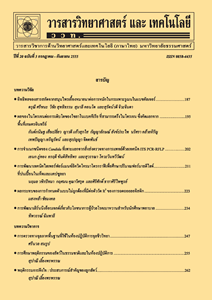อิทธิพลของสารสกัดจากใบชาจีนและใบหม่อนต่อการผลิตของไก่ไข่ คุณภาพไข่ และโคเลสเตอรอลในไข่แดง
Main Article Content
บทคัดย่อ
บทคัดย่อ
การศึกษาผลของการเสริมสารสกัดใบชาจีนและใบชาหม่อนในระดับต่างๆ ในอาหารไก่ไข่ต่อการผลิตไข่และคุณภาพของไข่ โดยวางแผนการทดลองแบบสุ่มสมบูรณ์ ใช้สูตรอาหารทางการค้าเป็นอาหารควบคุมและอาหารควบคุมที่เสริมสารสกัดใบชาจีน 0.5 และ 1.0 % ใบชาหม่อน 0.5 และ 1.0 % และสารสกัดใบชาจีนผสมใบชาหม่อนอย่างละ 0.5 % (A, B, C, D, E และ F ตามลำดับ) โดยทำการทดลองในไก่ไข่พันธุ์อิซ่าบราวน์อายุ 46 สัปดาห์ จำนวน 240 ตัว ทำการสุ่มออกมาเป็น 6 กลุ่ม กลุ่มละ 5 ซ้ำ ซ้ำละ 8 ตัว อาหารทุกสูตรมีโปรตีนและพลังงานเท่ากัน จากการศึกษาพบว่าไก่ไข่ที่ได้รับสูตรอาหารที่เสริมสารสกัดใบชาจีนหรือใบชาหม่อนอย่างเดียว 0.5-1.0 % (B, C, D และ E) มีปริมาณอาหารที่กิน ผลผลิตไข่ ประสิทธิภาพการใช้อาหารต่อการผลิตไข่ 1 โหล มวลไข่ น้ำหนักไข่ คุณภาพภายในและภายนอกไข่ ไม่แตกต่างกับไก่ไข่ที่ได้รับสูตรอาหารควบคุม (A, P>0.05) ไก่ไข่ที่ได้รับสูตรที่มีการเสริมสารสกัดจากใบชาจีน 0.5 % ร่วมกับสารสกัดจากใบหม่อน 0.5 % (F) มีปริมาณอาหารที่กิน ผลผลิตไข่ ประสิทธิภาพการใช้อาหารต่อการผลิตไข่ 1 โหล มวลไข่ น้ำหนักไข่แดง สีไข่แดง สีเปลือกไข่ และฮอฟ์ยูนิต (Haugh unit) ไม่แตกต่างกับไก่ไข่ที่ได้รับสูตรอื่น (P>0.05) แต่มีน้ำหนักไข่ น้ำหนักเปลือกไข่ น้ำหนักไข่ขาว ความหนาเปลือกไข่ และความสูงไข่ขาวลดลงอย่างมีนัยสำคัญ (P<0.05) สูตรอาหารที่มีการเสริมสารสกัดใบชาจีนและใบชาหม่อนในระดับต่างๆ ทำให้ไก่ไข่มีการย่อยได้โปรตีนและอินทรียวัตถุลดลง (P<0.05) การใช้สารสกัดใบชาจีนและใบหม่อนทำให้ปริมาณโคเลสเตอรอลในเลือดมีแนวโน้มลดลง (P>0.05) ยิ่งไปกว่านั้นยังทำให้ high density lipoprotein (HDL) และ low density lipoprotein (LDL) ลดลงอย่างมีนัยสำคัญทางสถิติ (P<0.05) แต่โคเลสเตอรอลในไข่แดงไม่ลดลง (P>0.05)
คำสำคัญ : สารสกัดจากใบชาจีน; สารสกัดจากใบหม่อน; ไก่ไข่; ไข่แดง; ผลผลิตไข่ โคเลสเตอรอล
Abstract
The experiment was conducted to study the crude extract of Chinese tea and Mulberry leaf supplementation in laying hen diets on production and egg quality. Two hundred and forty layers (Isa Brown) at 46 weeks of age were divided into 6 treatments, each with 5 replicates (8 birds : replicate) according to a completely randomized design. The experimental diet was commercial layer diet and it was supplemented with Chinese tea extract at 0.5, 1.0 %, Mulberry leaf extract at 0.5, 1.0 % and Chinese tea extract 0.5 % with Mulberry leaf extract at 0.5 % (A, B, C, D, E and F, respectively). All diets were isonitrogenous and isocaloric. The results demonstrated that feed intake, egg production, feed conversion per dozen of eggs, egg mass, egg weight and internal and external egg quality of the layers fed with diet B, C, D and E were not significantly different (P>0.05) from those of the control (A). The layers fed with diet F had egg weight, shell weight, albumin weight, shell thickness and albumin high lower while feed intake, egg production, feed conversion per dozen of eggs, egg mass, yolk weight, yolk color, shell color and haugh unit were not significantly different when compared to those of other treatments. The crude extract of Chinese tea and Mulberry leaf supplementation significantly decreased protein and organic digestibility (P<0.05). Moreover, the crude extracts tended to decrease blood cholesterol (P>0.05) and significant decreased the HDL and LDL (P<0.05) when compared to the control. But yolk cholesterol contents were not significantly different (P>0.05) among the treatments.
Keywords: Camellia sinensis leaf extract; Morus alba L. leaf extract; layer; egg production; egg yolk; cholesterol


